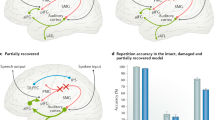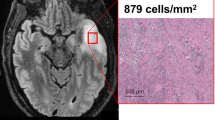Abstract
HERE we describe a patient who, as a result of brain damage, had a dramatic inability to retrieve proper names, and who thus offered the opportunity of observing the distinction made in the brain between proper and common names. Although category specific aphasic disturbances are relatively common1,2, this patient's anomia for proper names is very rare: only two other cases have been described so far3,4. The opposite phenomenon, a selective sparing of proper names, has also been recently observed5. It is widely assumed that double dissociations such as this reflect the premorbid organization of the cognitive system: the categories of proper and common nouns, therefore, would be separately represented or, at least, separately accessed in the intact brain. The only other such deficits, including the inability to learn arbitrary links between words and to guess the titles of pieces of music, are believed to be indicative of a problem in dealing with purely referential relations. This, in turn, would indirectly confirm the role of proper names as pure referring expressions.
This is a preview of subscription content, access via your institution
Access options
Subscribe to this journal
Receive 51 print issues and online access
$199.00 per year
only $3.90 per issue
Buy this article
- Purchase on Springer Link
- Instant access to full article PDF
Prices may be subject to local taxes which are calculated during checkout
Similar content being viewed by others
References
Semenza, C. & Denes, G. Aphasiology 2, 405–410 (1988).
McCarthy, R. A. & Warrington, E. K. Nature 334, 428–430 (1988).
McKenna, P. & Warrington, E. K. J. Neurol. Neurosurg. Psychiat. 43, 781–788 (1978).
Semenza, C. & Zettin, M. Cognitive Neuropsychol. 5, 711–721 (1988).
Warrington, E. K., McCarthy, R. A. Brain 110, 1273–1296 (1987).
Goodglass, H. & Kaplan, E. The Assessment of Aphasia and Related Disorders. (Lea & Febiger, Philadelphia, 1972).
Bisiach, E., Cappa, S. & Vallar G. Guida all'esame neuropsicologico (Cortina, Milan, 1983).
Mill, J. S. A System of Logic (Longman, London, 1843).
Kripke, S. Naming and Necessity (Blackwell, Oxford. 1980).
Frege, G. in G. Frege, Funktion, Begriff, Bedeuntung (ed. Patzig, G.) 40–65 (Vandenhoeck und Ruprecht, Gottingen, 1982).
Searle, J. R. in Semantics, an Interdisciplinary Reader in Philosophy, Linguistics and Psychology (eds Steinberg, D. D. & Jakobovitz, L. A.) 134–141 (Cambridge University Press, 1971).
Warrington, E. K. & Shallice, T. Brain 107, 829–853 (1984).
Warrington, E. K. & McCarthy, R. A. Brain 106, 859–878 (1983).
Jackendoff, R., Semantic and Cognition (MIT Press, Cambridge, Massachusetts, 1983).
Author information
Authors and Affiliations
Rights and permissions
About this article
Cite this article
Semenza, C., Zettin, M. Evidence from aphasia for the role of proper names as pure referring expressions. Nature 342, 678–679 (1989). https://doi.org/10.1038/342678a0
Received:
Accepted:
Issue Date:
DOI: https://doi.org/10.1038/342678a0
This article is cited by
-
Proper and common names in the semantic system
Brain Structure and Function (2023)
-
Naming famous people through face and voice: a normative study
Neurological Sciences (2020)
-
Recognition and naming of famous buildings: Italian normative data
Neurological Sciences (2010)
-
Factors affecting the retrieval of famous names
Neurological Sciences (2010)
-
Capgras delusion
Neurological Sciences (2007)
Comments
By submitting a comment you agree to abide by our Terms and Community Guidelines. If you find something abusive or that does not comply with our terms or guidelines please flag it as inappropriate.



